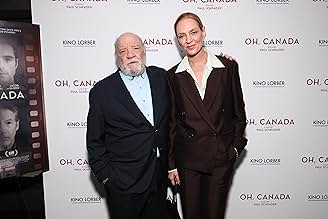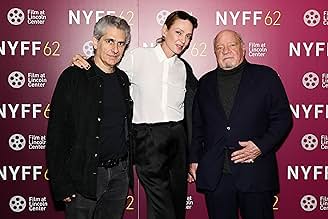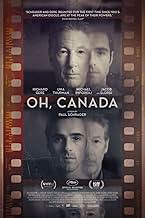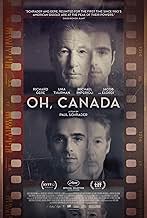Oh, Canada
- 2024
- Tous publics
- 1h 31min
NOTE IMDb
5,6/10
2,4 k
MA NOTE
Leonard Fife, l'un des soixante mille réfractaires et déserteurs qui se sont réfugiés au Canada pour éviter de servir au Viêt Nam, partage tous ses secrets pour démythifier sa vie mythifiée.Leonard Fife, l'un des soixante mille réfractaires et déserteurs qui se sont réfugiés au Canada pour éviter de servir au Viêt Nam, partage tous ses secrets pour démythifier sa vie mythifiée.Leonard Fife, l'un des soixante mille réfractaires et déserteurs qui se sont réfugiés au Canada pour éviter de servir au Viêt Nam, partage tous ses secrets pour démythifier sa vie mythifiée.
- Réalisation
- Scénario
- Casting principal
- Récompenses
- 1 victoire et 2 nominations au total
Avis à la une
Jack elordi is the young leo fife, while richard gere is the older, grown up film maker. He's telling his story towards the end of his life, but it's very complicated. He admits to making mistakes, but he says he will tell the truth. Flashback to fife as a young man. So many decisions to be made. Going to war. Running a company. Leaving. Always leaving. But some of the stories get so strange, it's not clear what's true and what is just being mis-remembered. Maybe the lies about all the lies is the real story. And the fact that fife has cancer. He's quickly getting confused and feeble, and angry. It's interesting. And mostly good. The jumping forward and backward sometimes gets confusing. The amount of uncertainty and confusion will annoy some people. Many things are left to the viewer to resolve. Directed by paul schrader. Was nominated for first reformed. Story by russell banks.
It's bad enough when a film disappoints and doesn't live up to expectations. But what's perhaps worse is when a picture not only fails to live up to expectations, but also validates the negative reputation that precedes it. Such is the case, regrettably, with the latest feature from filmmaker Paul Schrader, an embarrassingly bad production from an artist who has written and/or directed such masterful works as "First Reformed" (2017), "American Gigolo" (1980), "Mishima: A Life in Four Chapters" (1985), "The Last Temptation of Christ" (1988) and "Taxi Driver" (1976). This miserably unfocused slog struggles to tell the story of Leonard Fife (Richard Gere), a famous but terminally ill director who's being interviewed for a made-for-TV biography discussing his legendary life and career as a revered documentary filmmaker. However, the protagonist doesn't see this so much as a congratulatory tribute to his accomplishments but as a cathartic, unburdening confession about the life he led that virtually no one knows anything about. To complicate matters, his rapidly failing health and cloudy memory keep him from fulfilling this objective, especially when he reveals secrets about himself not known by even those closest to him (most notably, his wife, Emma (Uma Thurman), and his protégé, Malcolm (Michael Imperioli), director of the biography), revelations that they're quick to attribute to faulty recall. Leonard's previously hidden back story comes to life through a series of clumsy, disjointed flashbacks featuring his younger self (Jacob Elordi) presented in a largely unintelligible fashion that brings new meaning to the term "nonlinear." What's worse, though, is that the relevance of these admissions largely goes unexplained and unresolved, bearing seemingly little relation to the nature of his character or his career as an auteur. His flight to Canada and experience as a conscientious objector during the Vietnam War, for example, receives surprisingly little attention given that his defection from the US is essentially responsible for what made his vocation as a filmmaker possible. Then there are snippets from his many passing dalliances with women that make for a story more like "Oh! Calcutta!" than "Oh, Canada." Taken together, these elements make for a hodgepodge of moments from a life undefined, one that viewers are likely to care little about in the end. Such work is highly uncharacteristic for an artist like Schrader, which makes the impression it leaves all the more worse. Whatever the director was going for here, it's not particularly clear. And that's too bad, given that the filmmaker appears to have had plenty of good material and resources to work with here, including a cast of players who turn in some of their best-ever on-screen performances, the dreadful script that they've been handed notwithstanding. For what it's worth, the result is a major disappointment, one that exceeds the negative impressions it has already left on so many movie lovers who expect more from a talent like this.
At best, this appears to be a case of Paul Schrader reading a novel and getting so impressed by it that he leapt straight into adapting the parts he seemingly considered most relatable, and somewhere along the way, he appears to have forgotten most of his audience would not have read that novel and so be lost when it comes to what he considers "obvious". At worst...well, consider that a director who just two years ago claimed "woke Oscars mean less each year" had now made a film where the moral center of its universe is a pillar of 1960s medium enterprise capitalism, and we are effectively told outright the main character's life had been a failure ever since he abandoned his chance to succeed in his footsteps and pursued filmmaking instead. Quite a coincidence, don't you think?
To clarify, I am fine with the premise that the main character is a jerk. Lots of great fiction features a badly (at times overwhelmingly) flawed protagonist - but to be great or at least good, it needs to be interesting! "Leonard" here is shown to be unsympathetic so early and so decisively, the narrative then proceeds to simply compound the point we already know, and not in captivating ways either. Perhaps the novel was more careful about building Leonard Fife up first so that knocking him down would actually be dramatic but Schrader neglected it; perhaps, he assumed viewers would associate the main character with himself (some reviewers certainly appear to have made that connection, even I very much doubt it) and thus project the films Schrader directed IRL onto him. However, it is just as possible this is simply how Schrader thought the story ought to be, with no other caveats.
Even worse is that the film is actively hostile to not just him as a person, but also to his work and seemingly the entire field of documentary filmmaking. A talented artist being an awful person is a frequent, completely believable story - but here, he effectively stumbles into success. Even after his first lucky break, he is never shown doing anything which requires skill (other than perhaps being able to quote Sontag) - and yet, he is feted as an icon by the Canadian society as a whole and by his colleagues. The unmistakable implication is that the other documentarians work even less than he did, and the effete Canadian society is unable to tell a real talent from a fraud. Considering that Schrader has little connection to Canada and the only thing he ever made which can charitably be called a documentary is a 5m short about his painting, it's hard to avoid viewing this as a reflection of personal beliefs.
Funnily enough, the strongest parts of the film all involve what would ordinarily be a mere framing device. The film would unironically be better if it never left that one house in the present day, if it was just Richard Gere rambling on aloud and in his internal monologue while Uma Thurman is trying in vain to hold him back and we never got to see a single flashback play out on the screen.
To clarify, I am fine with the premise that the main character is a jerk. Lots of great fiction features a badly (at times overwhelmingly) flawed protagonist - but to be great or at least good, it needs to be interesting! "Leonard" here is shown to be unsympathetic so early and so decisively, the narrative then proceeds to simply compound the point we already know, and not in captivating ways either. Perhaps the novel was more careful about building Leonard Fife up first so that knocking him down would actually be dramatic but Schrader neglected it; perhaps, he assumed viewers would associate the main character with himself (some reviewers certainly appear to have made that connection, even I very much doubt it) and thus project the films Schrader directed IRL onto him. However, it is just as possible this is simply how Schrader thought the story ought to be, with no other caveats.
Even worse is that the film is actively hostile to not just him as a person, but also to his work and seemingly the entire field of documentary filmmaking. A talented artist being an awful person is a frequent, completely believable story - but here, he effectively stumbles into success. Even after his first lucky break, he is never shown doing anything which requires skill (other than perhaps being able to quote Sontag) - and yet, he is feted as an icon by the Canadian society as a whole and by his colleagues. The unmistakable implication is that the other documentarians work even less than he did, and the effete Canadian society is unable to tell a real talent from a fraud. Considering that Schrader has little connection to Canada and the only thing he ever made which can charitably be called a documentary is a 5m short about his painting, it's hard to avoid viewing this as a reflection of personal beliefs.
Funnily enough, the strongest parts of the film all involve what would ordinarily be a mere framing device. The film would unironically be better if it never left that one house in the present day, if it was just Richard Gere rambling on aloud and in his internal monologue while Uma Thurman is trying in vain to hold him back and we never got to see a single flashback play out on the screen.
With such a great cast of actors like Richard Gere, Uma Thurman, and Michael imperioli, you would think you'd have of star power to create a better movie than this. Well, you would be wrong. Paul Schrader goes "experimental" in a movie that looks like something a first year film student would make.
Schrader claims to have been friends with the war protester/filmmaker on whose life story this film is based, but with friends like this who needs enemies?
Richard Gere's character becomes increasingly more unlikable, and gradually loses the ability to express himself in words as he rages at everyone around him, mumbling as he descends into darkness. In other words he becomes just like Paul Schrader is today.
Do yourself a favor and skip this one, even on streaming I can't imagine it would be any better if you're able to pause it and leave the room to do more important things than watch this sad excuse of a movie.
Schrader claims to have been friends with the war protester/filmmaker on whose life story this film is based, but with friends like this who needs enemies?
Richard Gere's character becomes increasingly more unlikable, and gradually loses the ability to express himself in words as he rages at everyone around him, mumbling as he descends into darkness. In other words he becomes just like Paul Schrader is today.
Do yourself a favor and skip this one, even on streaming I can't imagine it would be any better if you're able to pause it and leave the room to do more important things than watch this sad excuse of a movie.
10parisdv
I watched this at Cannes, at the film's premiere.
OH, CANADA is a highly original film by one of the masters of cinema, a real work of art. The film is beautifully made with a strong visual look. It features beautiful cinematography and great production design. The acting is strong, especially Richard Gere who plays the protagonist. He gives a terrific and memorable performance in the vein of Jack Nicholson in FIVE EASY PIECES- a complicated, not always likable but compelling character.
It may not be everyone's cup of tea but I think it is one of Paul Schrader's greatest achievements, and a gift to cinema lovers. Recommended.
OH, CANADA is a highly original film by one of the masters of cinema, a real work of art. The film is beautifully made with a strong visual look. It features beautiful cinematography and great production design. The acting is strong, especially Richard Gere who plays the protagonist. He gives a terrific and memorable performance in the vein of Jack Nicholson in FIVE EASY PIECES- a complicated, not always likable but compelling character.
It may not be everyone's cup of tea but I think it is one of Paul Schrader's greatest achievements, and a gift to cinema lovers. Recommended.
Le saviez-vous
- AnecdotesSecond time that Paul Schrader has adapted one of Russell Banks' novels for the screen, following Affliction (1997).
- ConnexionsFeatured in The 7PM Project: Épisode datant du 28 mars 2025 (2025)
Meilleurs choix
Connectez-vous pour évaluer et suivre la liste de favoris afin de recevoir des recommandations personnalisées
Détails
- Date de sortie
- Pays d’origine
- Langues
- Aussi connu sous le nom de
- Канадець
- Lieux de tournage
- Harriman, New York, États-Unis(The scene that was filmed here is supposed to be a scene where the character played by Jacob Elordi, crosses over into Canada.)
- Sociétés de production
- Voir plus de crédits d'entreprise sur IMDbPro
Box-office
- Montant brut aux États-Unis et au Canada
- 200 980 $US
- Week-end de sortie aux États-Unis et au Canada
- 31 869 $US
- 8 déc. 2024
- Montant brut mondial
- 1 276 529 $US
- Durée1 heure 31 minutes
- Couleur
- Mixage
- Rapport de forme
- 2.35 : 1
Contribuer à cette page
Suggérer une modification ou ajouter du contenu manquant








































